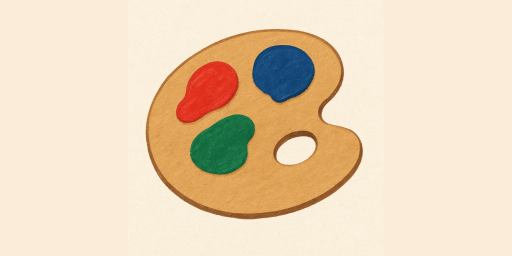Our current society is based on the idea of competition. It is believed (!) to be necessary to make people do something useful with their time, to help them fight their intrinsic laziness for the common good.
But competition is also the reason for conflicts between people. Several people might claim the same goods or privileges. Today we are relying mainly on two main mechanisms to mitigate this undesirable side effect of competition: left and right politics.
But what lies at the core of these ideas? In the following I will try to explain this using a visual metaphor.
Let’s look at a typical heterogenous society. It might consist of people with various cultural, religious backgrounds and races:

A heterogenous competitive society is challenging. Language barriers undermine trust between the groups because they lead to error-prone communication between members of different groups. Different cultural and religious backgrounds make it more difficult to predict the behavior of members of other groups which also reduces trust.
Altogether heterogeneity introduces friction into society.
There are basically two solutions for this problem:
- Separate the different groups (the „right“ solution). Within these homogenous groups people are then more or less free to do whatever they want (which we hope then to be naturally aligned with what other members of their group want)
- Mix the members of different groups, but make them equal (the „left“ solution). Promote a culture of ignoring differences as much as possible and make everybody adhere to a strict set of laws and moral rules to avoid friction.
Why the „right“ solution will never work
After a radical implementation of „right“ politics (e.g. „kick the foreigners out of our country!“), the situation might look like this:

The desired „pure“ society?
But there are several problems with this „solution“:
The people from the smaller groups are not gone. But we sure lose direct contact to them. Communication with the other group is now limited to electronic channels. This makes trusting them even more difficult. Therefore, what was an internal competitor often becomes an external enemy. The nature of conflicts shifts from small and frequent conflicts between individuals to rare, but possibly very intense conflicts between countries: now there is a risk for devastating wars. The total destructive potential of the situation remains the same (or even increases du too degraded communication).
But the solution rarely leads to harmony within the supposedly „pure“ country: people will very quickly find new differentiators to explain conflicts (like skin color). And even when all group members share the same race and cultural/religious background there is still the difference in social class.

Therefore the process is doomed to repeat, now with the new differentiator. It’s therefore very tempting for the leaders of such a group to point to the groups outside as the true reason for the group’s problems. This improves the perceived internal homogeneity, as the internal differences are smaller than those to the group outside. But this only shifts the conflict zone from inside to outside, further increasing the risk for war.
On the long run, the „problem“ with the groups outside always must be „solved“ to remove the permanent threat. Sooner or later they must be annihilated, to ensure the group's safety and prosperity (i.e. access to resources).
Right politics ultimately always means physical elimination of others.
Furthermore, the military power required to defend the group against other external groups (or attack them!) can always be used against the group itself:
Right politics is preparation for dictatorship.
Why the „left“ solution will never work
The basic idea is simple: make everybody equal. All differences in culture, race, religion and even sex should not matter:

Accordingly, all these things must be controlled, as they are prone to introduce friction into society. The tools used to control people’s behavior are culture, laws and moral. Left culture emphasizes similarities and tries to downplay differences. Of course culture is only a recommendation and works only to a certain extent. Where it fails, laws and moral come into play.
If a certain behavior creates friction, first new moral is introduced. But moral has the disadvantage that it's not mandatory. Therefore there are always some people which don’t care about it. As these people - caring only about the law but not about moral - are less restricted than those who also care about moral, they tend to be more successful compared to their morally obliged peers. This is a serious problem because on the long run the immoral people inevitably become more powerful which becomes a threat for society (they might use their power to overturn the system). Also, as the system is still competitive, people start to admire the immoral people for their success. They realize that it's mostly ignoring moral which gives them an advantage over the others.
Therefore, moral sooner or later always must be converted into law. This means that in the end every aspect of life must be regulated by mandatory laws.
And laws are only effective if they can be enforced. Therefore a fraction of the group must be assigned the function of police. And as most people don’t really enjoy to have every of their moves restricted by laws, this police force must be of substantial size.
Left politics ultimately must lead to a control addicted police state.
Of course the idea of the police collides with the idea of equality. A small fraction of the population is given the privilege (and the required weapons) to use force. They are always tempted to use their privileges to improve their own situation.
Left politics is preparation for dictatorship too.
Now let’s look at the color metaphor again
What kind of paintings could we create with one of the following color palettes:

Nothing really interesting, of course (we have seen the corresponding boring pictures above)!
But what about an unrestricted, full palette with all possible colors?

Together we could achieve something like this:

This looks much more enticing! But why is this - somehow obvious - path so difficult to walk for us? The problem is our firm belief in owning and competition.
There is no alternative to the cooperative society
Image: "Impression, Sunrise" by Claude Monet
Follow me on X to get informed about new content on this blog.
